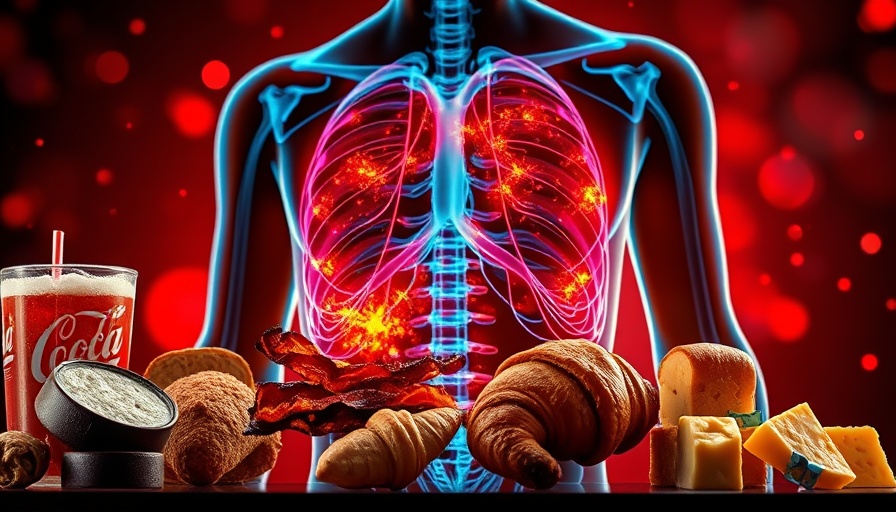
Understanding Chronic Inflammation: The Hidden Dangers in Our Diet
In recent years, the medical community has begun shifting its focus from merely treating symptoms to tackling root causes of diseases. One critical aspect receiving heightened attention is chronic inflammation, a silent yet powerful factor implicated in numerous health issues. While inflammation can serve a protective role, prolonged bouts can trigger a cascade of detrimental effects on the body, leading to severe conditions like cancer, heart disease, and diabetes.
The Inflammation Connection: How Diet Plays a Role
Chronic inflammation ignites when your body identifies a persistent irritant—such as harmful food substances—negating its natural healing mechanisms. Diet is a determinant factor in managing inflammation levels within the body. Specifically, foods laden with high-fructose corn syrup (HFCS), processed sugars, and unhealthy trans fats exacerbate the inflammatory response. To combat this rising threat, educating oneself on the dietary habits that may contribute to chronic inflammation is essential.
What Foods Should You Avoid?
Several types of foods are notorious for contributing to chronic inflammation. Here’s a closer look:
- Sugary Beverages: Drinks sweetened with HFCS and other sugar substitutes are among the biggest culprits. These substances can spike blood sugar levels and promote the release of pro-inflammatory cytokines.
- Refined Carbohydrates: White bread, pastries, and other refined grains can lead to unhealthy blood glucose spikes, creating a cycle of inflammation.
- Processed Meats: Foods such as hot dogs, ham, and other processed meats contain preservatives and chemicals that can initiate inflammatory pathways.
- Excessive Alcohol: While moderate consumption might have benefits, excessive alcohol intake induces significant inflammatory responses, particularly affecting the liver and gut health.
- Trans Fats: Found in many fried and processed foods, trans fats have been shown to increase inflammation while decreasing beneficial HDL cholesterol.
Recognizing the Signs of Chronic Inflammation
Many people may unknowingly suffer from chronic inflammation. Symptoms can range from mild fatigue to more complex issues such as joint pain and digestive troubles. Recognizing these signs is key to seeking dietary improvements. Moreover, fostering a greater awareness of food ingredients can arm individuals against inflammation-causing agents lurking in their meals.
Incorporating Anti-Inflammatory Foods
On the flip side, many foods possess natural anti-inflammatory properties. Incorporating these into your diet can help mitigate the risks associated with chronic inflammation:
- Fruits and Vegetables: Berries, cherries, spinach, and kale are rich in antioxidants, which help combat oxidative stress.
- Healthy Fats: Foods rich in omega-3 fatty acids, such as salmon, walnuts, and flaxseeds, can help reduce inflammation.
- Nuts and Seeds: Almonds and chia seeds can also provide essential fatty acids and other nutrients that protect against inflammation.
- Whole Grains: Unlike refined carbohydrates, whole grains such as brown rice and quinoa can offer vital nutrients without the spike in blood sugar.
- Spices: Turmeric and ginger have been highlighted for their potent anti-inflammatory effects.
Rethinking Your Lifestyle
Adopting a lifestyle that reduces chronic inflammation isn't just about dietary changes; it's also about holistic practices. Incorporating regular physical activity, stress management techniques like yoga and meditation, and ensuring adequate sleep can play critical roles in managing inflammation levels.
Moving Forward: A Call for Awareness
The evidence has mounted: chronic inflammation is deeply intertwined with the foods we consume. By becoming informed about our dietary choices and opting for more wholesome, natural ingredients, we can make a substantial impact on our overall health. The next time you fill your plate, consider the potential inflammatory agents lurking in your food—and take control of your health journey. Stepping into the world of nutrition armed with knowledge promises a healthier body and a vibrant life.
 Add Row
Add Row  Add
Add 




Write A Comment